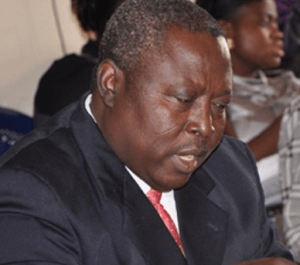Workers of OSP need security clearance to marry

A Legislative Instrument (LI) on the Office of the Special Prosecutor (OSP) obligates employees of the office to undergo security checks and be cleared before they can enter into any marriage arrangement.
By this, the Office would thoroughly assess would-be husbands and wives of its staff through a vetting process, as done in some state security agencies.
The law also compels an employee who intends to get married to also notify the Special Prosecutor, Martin Amidu, not later than three months before the intended marriage, and the marriage would be approved when security clearance is given by the OSP.
Similarly, where the employee intends to marry a foreigner, the marriage shall be approved when security clearance is given by the OSP.
Parliament, sitting at the week-end, on Saturday approved Legislative Instrument to guide the operations of the OSP, despite the divergent positions when the particular clause for the vetting of potential spouses came up.
While a section of the house said the provision is surprising, others said such a regime is important to ensure that spouses of the employees do not compromise the integrity of the office.
According to the Regulation, where in the opinion of the OSP, the marriage poses a security risk, the Special Prosecutor may disapprove of the marriage. If the employee insists on proceeding with the marriage irrespective of the disapproval of the Special Prosecutor, the Special Prosecutor may direct the employee to resign or be dismissed.
The Regulation further demands from any employee of the OSP involved in any matrimonial suit to notify the Office of the facts.
Where the suit has the potential to discredit the employee, the OSP or the Government, that employee is expected to take steps to resolve that matter amicably, failing which the employee would be called upon to resign.
Mr Bernard Ahiafor, the Vice Chairman of the Subsidiary Legislation Committee of Parliament, moving the motion on the LI said: “The provisions are in tandem with the Bureau of National Investigations condition. As with the BNI, a spouse or a prospective staff of an employee of the special prosecutor must be subjected to vetting.
“An employee who intends to get married shall notify the special prosecutor not less than 3 months before the intended marriage. The marriage will be approved when the security clearance is given by the office of the special prosecutor.”
Mr Ahiafor, who is also the MP for Akatsi South, argued that the move is to ensure staff of the office of the Special Prosecutor’s Office are not compromised or compromised by their relationships.
Mr Ahiafor said the Regulations were drafted alongside that of the Bureau of National Investigations Regulations, 2015 (L. I. 2227).
Mr Ben Abdallah Banda, the Chairman of the Constitutional, Legal and Parliamentary Affairs Committee who is also a member of the Subsidiary Legislation Committee, seconding the motion said the regulations are in order since they conform to that of all the security agencies around the world.
“A wife or husband of an employee of the Office of the Special Prosecutor headed by Martin Amidu, must be able to keep secrets,” adding that the spouse must not be money conscious be at a high risk of being influenced to divulge information to the public.
“The Office of the Special Prosecutor is dealing with high profile and sensitive information relating to investigations relating to prosecution. So, if the employee doesn’t get a spouse who can keep a secret relating to investigations and prosecution, the tendency is that all sensitive and secretive information will be given out.
“Secondly, the rationale behind the vetting of a potential spouse is that the Office must ensure that a spouse who is being married by an employee is somebody conscious. If you have somebody who is money conscious, the tendency is that the spouse can be susceptible to bribery and for which reason if the wife can easily be bribed, the tendency is that such a person can easily send information out.”
He stressed that the assessment was necessary to ensure that confidential information regarding investigations and prosecutions of the office are not exposed to the public through spouses of employees.
Speaker of Parliament Professor Aaron Michael Oquaye informed the House that at one time, his wife who was a military officer sought permission from the rank and file of the Ghana Army for their marriage to come off.
“Those who are not aware, this applies to the military and it applies to all the security agencies. You cannot just marry and you don’t have to be in the service, “the Speaker said, adding, “you have to resign if you want to be by all means go and do your own thing.
“It is as simple as that and it is universal and it applies to all these institutions. At time, my wife needed permission to marry me,” he said.
In a related development, the Minority National Democratic Congress (NDC) in Parliament is asking the OSP to justify some GH¢30 million expenditure items in its budget estimates, as it holds the view that the amount captured under management and administration and operations under anti-corruption management as other expenses of GH¢ 20 million and GH¢10million respectively could not be justified.
Source: GNA
